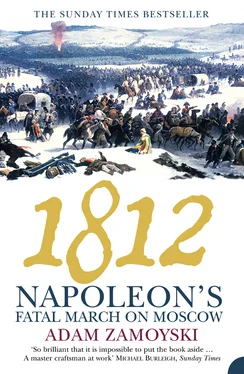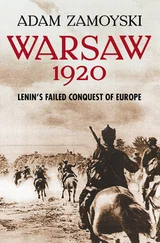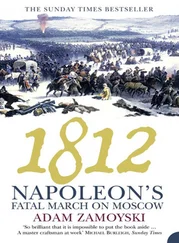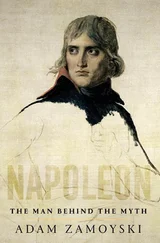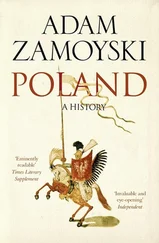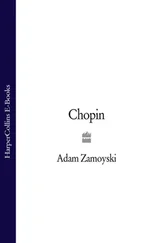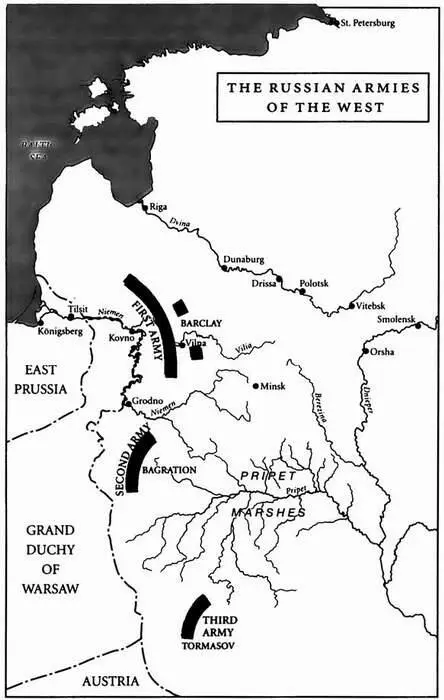
This force was backed up by two reserve corps, Ertel’s of 55,000/ 65,000, and Meller Zakomelsky’s of 31,000/47,000, bringing the total of the Russian forces facing Napoleon to 392,000. Behind them a second wave of units was being formed. As soon as Alexander’s diplomatic demarches had secured peace with Sweden and Turkey, another 28,500/37,200 troops from Finland and 54,500/70,000 from Moldavia would be brought into play. The armies at the front were well supplied and supported for an offensive by a series of magazines at Vilna, Shvienchiany, Grodno and elsewhere, and a second line stretching behind that from Riga in the north to Kaluga in the south. 21
It is difficult to gauge what Alexander intended by coming to Vilna, as he gave no indication that he meant to take command. His armies had been massing in the region for the past eighteen months, and were poised along the frontier in readiness to attack. The Tsar’s arrival at advance headquarters would, in the circumstances, suggest that the decision had been taken to launch the attack, since there could be no conceivable point in His Imperial Majesty coming all that way just to review them. In the event, Alexander’s presence helped to confuse what was already a highly confused situation.
The man ostensibly in command was the fifty-one-year-old Minister of War, General Mikhail Barclay de Tolly. He was an intelligent, sensible and competent man of strong character and independent judgement, who had shown his mettle in the field against Swedes, Poles, Turks and Frenchmen, being seriously wounded at Eylau. He was undoubtedly very brave and steady under fire. Alexander liked him and had promoted him over the heads of others, arousing their jealousy. He was reserved and stoical rather than affable, which did nothing to increase his popularity among his peers. As he could not count on their cordial cooperation, he was wont to look to everything himself. And although he had done more than any other to ease the lot of the common soldier, he was not the kind of commander who inspires devotion in the rank and file. 22
While Barclay had been appointed commander of the First Army, he had not been nominated commander-in-chief. This may have been because Alexander felt this to be unnecessary since he was also Minister of War, or it may have been because he intended to command himself, or did not want to offend others vying for the post.
Ostensibly, Alexander took no part in military affairs beyond inspecting fortifications and attending parades. But he did interfere in day-to-day business. And his presence at headquarters ineluctably diminished Barclay’s already fragile authority, as it gave huge scope for insubordination – and there was no lack of those who hated Barclay and resented the idea of serving under him.
Foremost amongst these was General Prince Piotr Ivanovich Bagration, commanding the Second Army. Bagration was a dashing battlefield general, recklessly brave, with a volcanic temper, a warm heart, and all the fiery bravado necessary to make him worshipped by his officers and men. Although younger than Barclay, he had been a general for longer and therefore felt he had a right to overall command. In the absence of any document stipulating that he must take his orders from Barclay, Bagration took the view that his command was an independent one. Alexander’s arrival at headquarters provided him with an excuse to send all his reports to the Tsar, as supreme commander, bypassing Barclay entirely.
Bagration’s position was a strong one. He was extremely popular with his fellow generals and had a great following at court. And, having been for a time Grand Duchess Catherine’s lover, he also had a slight ascendancy over Alexander, who did not like him but could not be seen to put him down.
Matters were made no easier by the Tsar’s younger brother Grand Duke Constantine Pavlovich, who commanded the Imperial Guard, an unbalanced blusterer whose only real pleasure in life derived from making troops parade before him. For him, the parade was a kind of ballet – perfect precision in the choreography and meticulous attention to dress were assured by the generous distribution of savage punishments for being a few inches out of line or missing a button. Between parades, Constantine could be counted on to support anyone who criticised Barclay or failed to carry out one of his orders.
This state of affairs opened the door for a comeback by General Levin Bennigsen. A Hanoverian by birth, this old professional soldier had taken service in Russia more than fifty years before. A competent commander, if a little fussy and ponderous, he had risen slowly but surely, and assured his survival in Alexander’s good graces by being one of those who had murdered his father. He had ended his military career on a less than satisfactory note, leading the Russian army to defeat at Friedland. He was now sixty-seven years old. He had retired, and was living on his estate of Zakrent, which happened to be a few kilometres outside Vilna. Ever since Friedland he had longed for a chance to redeem his reputation, and felt it was he, not Barclay, who should be given overall command. Upon his arrival in Vilna, Alexander summoned Bennigsen and asked him to return to service in an unspecified capacity in his personal entourage.
This was already alarmingly large. Alexander was surrounded by a swarm of unofficial advisers, including his brother-in-law Prince George of Oldenburg, his uncle Prince Alexander of Württemberg, the Swedish adventurer Gustav Mauritz Armfeld, the French émigré Jean Protais Anstett, and a host of others. This was partly the result of Alexander’s longer-term views and ambitions. ‘Napoleon means to complete the enslavement of Europe, and to do so he has to strike Russia down,’ he wrote to Baron vom Stein, inviting him to come and help plan the crusade for its liberation. ‘Every friend of virtue, every human being who is animated by the sentiment of independence and love of humanity is interested in the success of this struggle.’ 23
Since Alexander also needed to carry on exercising political power, he had instructed his most important ministers to follow him to headquarters. He was soon joined in Vilna by Admiral Shishkov, who was slightly baffled to find himself, the effective Prime Minister and Minister of the Interior, stuck out at military headquarters. General Arakcheev, head of the Council of State’s Military Committee and Secretary to the Emperor for Military Affairs, was also in attendance. Chancellor Rumiantsev suffered a mild stroke on his way to Vilna, but this did not stop him joining the Tsar, though Alexander henceforth conducted his diplomatic business through his Secretary for Foreign Affairs Karl von Nesselrode.
The presence of so many different hierarchies of power had undesirable repercussions in the army at every level, and exacerbated a problem, created by the dearth of native officer material, which was to bring forth torrents of bad blood and bedevil the conduct of the campaign: the presence of large numbers of foreigners.
There were literally hundreds of French officers serving in the Russian army, most of them émigré aristocrats who had fled the revolution. They occupied a variety of posts, including some of the highest, with the Marquis de Traversay Admiral-in-Chief of the Russian Fleet, the Comte de Langeron and the Marquis Charles Lambert in command of army corps and General de Saint-Priest as chief of staff to the Second Army. There were also Italians, Swiss, Swedes, Poles and others: Barclay came of a family of Baltic barons who traced their ancestry to the Barclays of Towie in Scotland; Bagration’s origins were Georgian. But those who caused the greatest problem were the Germans, and particularly the Prussians.
Читать дальше
